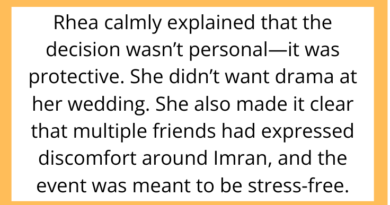AITAH for Refusing to Pay for My Girlfriend’s Expensive Birthday Trip When I Never Agreed to It?
Relationships are full of compromise—but what happens when one partner expects grand gestures without agreement, and the other feels ambushed into paying? In this AITAH-inspired story, we explore a heated birthday dilemma that had Reddit’s AITAH community fired up.
Let’s dig into whether refusing to fund a surprise trip makes someone a villain—or just financially responsible.
The Setup: A Trip No One Asked For

Meet Arjun, a 28-year-old software engineer who shared his story on r/AITAH. Arjun had been dating his girlfriend, Neha, for a little over a year. They had a solid relationship built on mutual respect—or so he thought.
As Neha’s 27th birthday approached, Arjun asked what kind of celebration she wanted. She casually mentioned wanting a relaxing weekend, maybe dinner and a movie. Nothing extravagant. Arjun planned accordingly.
That’s when things took a turn.
Just a week before her birthday, Neha excitedly sent Arjun a complete itinerary for a four-day trip to the Maldives—flights, hotel bookings, activities, all already reserved. The total cost? Over ₹2.5 lakhs (roughly $3,000).
She assumed Arjun would pay for all of it.
The Confrontation: “This Is How You Show You Care”

Arjun was shocked. He hadn’t agreed to any trip—let alone one this expensive. When he told Neha he couldn’t and wouldn’t pay for a surprise trip he never approved, she accused him of being “cheap,” “unromantic,” and not putting enough effort into her birthday.
“She said if I really loved her, I’d find a way to make it happen,” Arjun explained in his post. “But I never agreed to any of it.”
Neha’s friends chimed in too, saying Arjun was being controlling and dismissive of Neha’s “love language.”
Feeling blindsided and manipulated, Arjun canceled any plans he’d made and told Neha to go on the trip solo—if she could afford it. She didn’t take that well.
Now, Arjun’s questioning if he was too harsh. AITAH for refusing to pay for the birthday trip?
The Breakdown: Romance vs. Reality

Arjun’s Perspective: Financial Consent Matters
Arjun never agreed to the trip, wasn’t consulted, and was expected to shell out a large sum without warning. This isn’t just about romance—it’s about financial autonomy.
While birthday surprises can be sweet, they shouldn’t come with a price tag someone else is forced to pay. Arjun’s refusal wasn’t about being stingy—it was about setting boundaries around money and expectations.
Neha’s Perspective: The Birthday Test
From Neha’s point of view, Arjun’s refusal may feel like a rejection. Maybe she saw this trip as a way to measure his commitment. Maybe she grew up in a culture where lavish gifts symbolize love.
She likely thought Arjun would be excited to spoil her, and his refusal shattered that image. But intentions don’t override agreements—or budgets.
Reddit Reacts: The Crowd Has Spoken

The AITAH subreddit was quick to side with Arjun.
“You don’t surprise someone with a bill,” one comment read. “That’s not a gift—that’s a trap.”
Others pointed out that relationships require mutual planning, especially when large expenses are involved.
A few, though, sympathized with Neha, suggesting Arjun could have softened the blow or found a middle ground, like a smaller trip.
Still, the consensus was clear: assuming someone will fund your fantasies without consent makes you the villain.
Red Flags in Disguise: When Gifts Come with Pressure

This situation exposes a common issue in modern relationships: the difference between generosity and obligation.
Here are some red flags to watch out for:
-
Surprise expenses that require your financial contribution.
-
Emotional manipulation, like equating love with money.
-
One-sided expectations, where only one person compromises.
Relationships thrive on shared goals—not ambushes disguised as romance.
How Could This Have Gone Better?

For Arjun:
-
He could have clearly communicated his budget limits earlier in the relationship.
-
Reaffirm his feelings while standing firm on financial boundaries.
-
Suggest a thoughtful alternative within his means.
For Neha:
-
Talk through plans instead of assuming agreement.
-
Learn to separate love from lavishness.
-
Consider that a partner’s value isn’t measured by how much they spend.
The Verdict: Not the Villain

Arjun wasn’t the villain for saying no. In fact, he did the right thing by standing up for his financial boundaries. Love isn’t about draining your savings account—it’s about trust, respect, and clear communication.
Neha’s disappointment is understandable. But her approach? Not okay.



